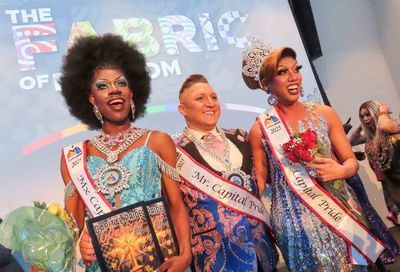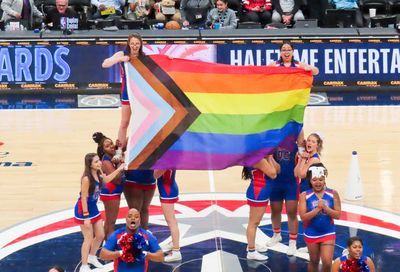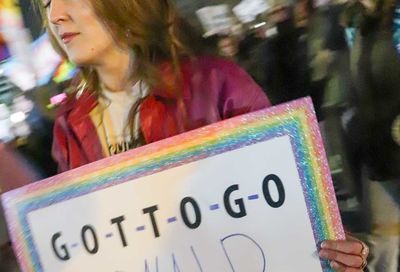Boston Marriage
Alphabet Soup
Amid all the hubbub about a certain exposed breast last week, something more spectacular than even Janet Jackson’s elaborate nipple jewelry flashed before the public eye.
In case you’ve been living under a rock, or had your eyes and eardrums poked out by a wayward underwire, the highest court in Massachusetts ruled that no, silly legislators, you can’t take our earlier edict and turn it into a civil unions law. We said marriage, damn it.
They put it more eloquently than that. In fact, in an almost lyrical nod to justice, the court summed up the problem in a way that was long overdue: “The history of our nation has demonstrated that separate is seldom, if ever, equal.”
Right on, brothers and sisters.
Meanwhile, as it looks more and more like Massachusetts Sen. John Kerry will become the Democratic candidate for president, naturally the question arises about how he feels about the ruling by the high court in his home state. While it’s not a surprise to hear that he is still, in the face of last week’s ruling, firmly opposed to gay marriage, it is frustrating to hear the justification for his point of view.
Kerry told NPR this week that he is in favor of civil unions and partnership rights for gay couples, but not marriage. In response to a question about whether or not he would support a constitutional amendment banning gay marriages, he hedged.
“It depends entirely on the language of whether it permits civil union and partnership or not,” Kerry said. “I’m for civil union, I’m for partnership rights. I think what ought to condition this debate is not the term ‘marriage’ as much as the rights that people are afforded…. But what you call something is not that critical.”
He went on to explain that marriage began as a religious institution, not a state-sanctioned entity, and for that reason, gay marriages is none of the government’s business.
“Obviously under the Constitution of the United States, you need equal protection under the law,” he explained, “and I think equal protection means the rights that go with it. I think the word marriage kind of gets in the way of the whole debate, to be honest with you. Because marriage to many people is obviously what is sanctified by a church, it’s sacramental — or by a synagogue or by a mosque or by whatever religious connotation it has, and clearly there’s a separation of church and state here.”
I’ll give John Kerry some latitude on this issue, and go with his argument for a minute. Marriage is what is sanctified by a church — or by a synagogue, or by a mosque, or by whatever religious connotation it has.
Thus Kerry makes room for all manner of religious identities, so I assume he’d make room for my church, too — I am a Unitarian Universalist, and in that church more than three years ago my partner stood up with a minister of the faith, exchanged vows, and did many of the things that heterosexual people do in church weddings.
I’ve never been comfortable with referring to our relationship as a marriage, because I think it perpetuates a myth believed by too many straight people — and not a few gay people — that gays can actually get married if they want to. They figure it’s legal for us to trounce off to get married somewhere (and now it is, actually, thanks to our neighbors in one province to the north), but in fact, it’s not legal in our country anywhere.
Shortly before my ceremony, just before the election that preceded George W. Bush being crowned president in November 2000, I made a joking reference to my friend Sally about my upcoming “pseudo-nuptials.” I meant not to denigrate my relationship or the ceremony we were so busy orchestrating; I was being somewhat glib, and I thought Sally might understand where I was coming from, since she was then (and remains) one of the fierce warriors in the fight for gay civil rights, devoting her life’s work to our equality.
But Sally was chagrined, and jumped down my throat immediately, telling me I should not use language like that because it suggests that our partnerships are not every bit as good as the heterosexual partnerships that happen to get advanced legal recognition. While I stood by the accuracy of my words, I felt bad for doing anything to suggest that I felt inferior. I was trying to make a point about the law, I told her.
Days after our ceremony, the minister who had just officiated our happy event delivered to us a certificate declaring us married in the Unitarian Universalist faith. We were, at the time, brand spanking new to our church and to the faith; since it’s a “BYOB” (bring your own beliefs) denomination, it had never even occurred to me that there might be doctrine that included their firm declaration that I’d just been married.
John Kerry thinks marriages are sanctioned by churches. Sometimes, seemingly out of convenience, he’ll toss in the words “a man and a woman” — but nowhere in his comments on NPR did he address the reasons for his gender specifications. He simply said, a few times, that it was a church matter. In my own church, not specifically a Christian or Jewish or Muslim religion but certainly a valid one, gays can get married. Gays do get married.
If it’s a religious matter, why stop the state from recognizing what at least one religion deems holy? I don’t think anybody is interested in asking the state to force any particular religion to recognize gay marriages; after all, we let Catholics get away with pretending there’s no such thing as divorce, so clearly we’re not making any religion follow the letter of the law.
I learned recently about a collective of certain Unitarian Universalist ministers who, protesting the lack of equality of gays, decided to stop signing any state-issued marriage certificates. They would perform ceremonies, but told straight couples to look elsewhere to get their union legalized by the state. It would appear that this decision, and the actions, fell well within the bounds of legality — so what’s the fuss? Ministers can refuse to perform marriage ceremonies if they don’t want to, so when gay marriage becomes legal, those who don’t wish to sanction gay marriages can continue refusing to validate our relationships in their church.
John Kerry, who each day grows more likely to oppose Bush on the presidential ticket, deserves the gay community’s support because any man who wastes time and breath during a state of the union address to denigrate and vilify gay unions should be voted out of office. (Some might argue that there are other reasons to dethrone Bush, too.) But just as we can help put John Kerry in office, we can also make it very clear to him that separate is seldom, if ever, equal — and that what you call something is critical.
Kristina Campbell lives in Takoma Park, Md., and plans on spending her tourism dollars in Massachusetts, and wants you to know that the Massachusetts Gay and Lesbian Political Caucus (www.mglpc.org) needs your support.
Support Metro Weekly’s Journalism
These are challenging times for news organizations. And yet it’s crucial we stay active and provide vital resources and information to both our local readers and the world. So won’t you please take a moment and consider supporting Metro Weekly with a membership? For as little as $5 a month, you can help ensure Metro Weekly magazine and MetroWeekly.com remain free, viable resources as we provide the best, most diverse, culturally-resonant LGBTQ coverage in both the D.C. region and around the world. Memberships come with exclusive perks and discounts, your own personal digital delivery of each week’s magazine (and an archive), access to our Member's Lounge when it launches this fall, and exclusive members-only items like Metro Weekly Membership Mugs and Tote Bags! Check out all our membership levels here and please join us today!




















